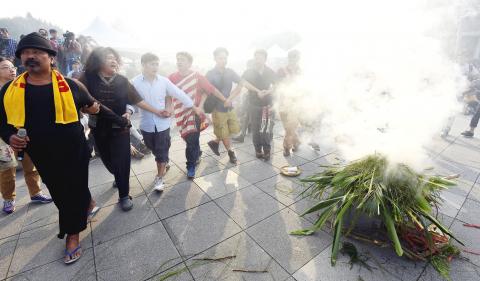Hundreds of music fans yesterday took in performances by independent musicians at the Gongsheng Music Festival (共生音樂節) in Taipei, a student-led event aimed at raising youth awareness of the 228 Incident.
The event marked the 68th anniversary of the 228 Incident, which refers to nationwide anti-government uprisings that began on Feb. 27, 1947, and a series of bloody purges that followed in the subsequent months by the then-Chinese Nationalist Party (KMT) regime.
The festival featured performances from many prominent folk singers and indie rock bands, accompanied by dozens of stands promoting the ideas of civic advocacy groups.

Photo: George Tsorng, Taipei Times
Lectures on the 228 Incident took place next to the music venue, while volunteers from activist groups weaved through the audience to garner support for various social causes and petitions — ranging from campaigns against land seizures to grassroots support for Taiwanese independence.
This year’s festival theme was “The Youth Rise Again,” in reference to the upsurge in youth activism over the past few years, including the Sunflower movement in March and April last year, in which student-led protesters occupied the main chamber of the Legislative Yuan for almost 23 days over the government’s handling of the cross-strait service trade agreement.
Now in its third year, the event was spearheaded by a coalition of students from several universities nationwide.
The organizers said that like contemporary Taiwanese youth devoted to social reform, many youth organizations stand against the authoritarianism of the 228 Incident.
“We wanted to emphasize the role of youth activism in relation to the 228 Incident,” National Taiwan University political science student and event organizer Chen Ming-kai (陳銘凱) said.
He added that the event has garnered more support and attention as a result of the Sunflower movement last year.
Freddy Lim (林昶佐), lead singer of the metal band Chthonic and founding member of the New Power Party, said that it was important to spread knowledge of Taiwanese history through such events.
“The whole world knows that Chiang Kai-shek (蔣介石) is among the top five dictators in the world, who slaughtered the most people during peacetime, but it seems like only Taiwanese people do not know and continue to vote his party [the KMT] into office,” Lim said while pointing toward the nearby Chiang Kai-shek Memorial Hall.
Taiwan Association for Truth and Reconciliation executive secretary Yeh Hung-ling (葉虹靈) said that although many historical files from Taiwan’s authoritarian period have been made public — including those related to the 228 Incident and the subsequent White Terror era — not enough government resources have been devoted to conducting research on the files.
She urged young Taiwanese to conduct their own historical research on Taiwan’s authoritarian past by applying for files through the National Archives Administration’s online system.

A strong continental cold air mass is to bring pollutants to Taiwan from tomorrow, the Ministry of Environment said today, as it issued an “orange” air quality alert for most of the country. All of Taiwan except for Hualien and Taitung counties is to be under an “orange” air quality alert tomorrow, indicating air quality that is unhealthy for sensitive groups. In China, areas from Shandong to Shanghai have been enveloped in haze since Saturday, the ministry said in a news release. Yesterday, hourly concentrations of PM2.5 in these areas ranged from 65 to 160 micrograms per cubic meter (mg/m³), and pollutants were

Taiwan’s armed forces have established response protocols for a wide range of sudden contingencies, including the “Wan Chun Plan” to protect the head of state, the Ministry of Defense (MND) said today. After US President Donald Trump on Saturday launched a series of airstrikes in Venezuela and kidnapped Venezuelan President Nicolas Maduro, concerns have been raised as to whether China would launch a similar “decapitation strike” on Taiwan. The armed forces regularly coordinate with relevant agencies and practice drills to ensure preparedness for a wide range of scenarios, Vice Minister of National Defense Hsu Szu-chien (徐斯儉) told reporters before a

EVA Airways on Saturday said that it had suspended a pilot and opened an investigation after he allegedly lost his temper and punched the first officer several times as their plane was taxiing before takeoff at Los Angeles International Airport. According to a report published on Thursday by The Reporter, the incident occurred after the flight’s Malaysian first officer tried to warn the Taiwanese pilot, surnamed Wen (文), that he was taxiing faster than the speed limit of 30 knots (55.6kph). After alerting the pilot several times without response, the first officer manually applied the brakes in accordance with standard operating

NOT AN OPENING: Trump’s violation of international law does not affect China’s consideration in attacking Taiwan; Beijing lacks capability, not precedent, an official said Taiwanese officials see the US’ capture of the president of Venezuela as a powerful deterrent to Beijing’s aggression and a timely reminder of the US’ ability to defeat militaries equipped with Chinese-made weapons. The strikes that toppled Venezuelan President Nicolas Maduro signaled to authoritarian leaders, including Chinese President Xi Jinping (習近平), US President Donald Trump’s willingness to use military might for international affairs core to US interests, one senior official in Taipei’s security circle said. That reassured Taiwan, the person said. Taipei has also dismissed the idea that Trump’s apparent violation of international law could embolden Beijing, said the official, who was not